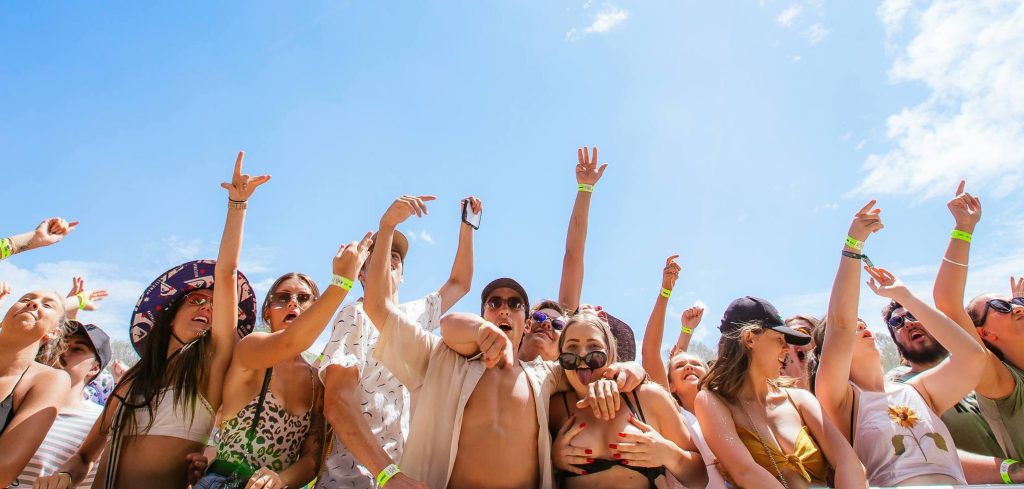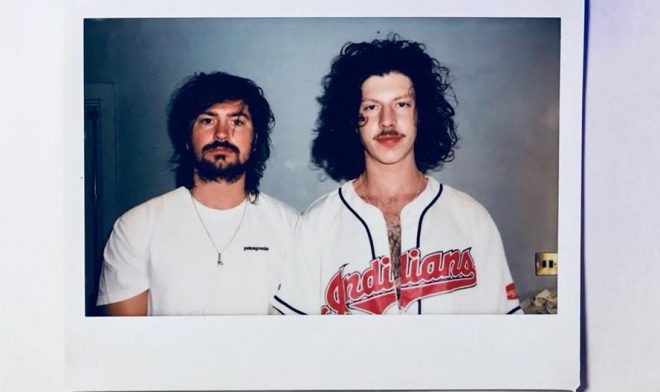Junk Explained: Here’s Why The Music Industry Is So Pissed Off At Viagogo
"We're gonna crush the industry by allowing these kinds of processes to flourish unchecked."

In a couple of months, Canberra party starters Peking Duk will hit the road for their ‘Wasted’ tour. They’ll be playing a number of dates around the country, and tickets are — as expected — being snapped up fast. But according to a particularly angry post on Peking Duk’s Facebook page earlier this week, a lot of the tickets being purchased aren’t coming from the right places.
“We are getting comments and messages from you about buying your tickets off Viagogo,” the duo wrote. “We can understand why this may be confusing — as Viagogo the filthy fucking cheats are the top result when searching for our shows…but please do not buy tickets from Viagogo.”
They’re not the first local band to take on the controversial ticket reseller this year. In January, Menangle crew The Rubens blasted the site for advertising tickets to their shows at over three times the original price.
“We REALLY hate Viagogo,” the band wrote on Facebook. “They exist to rip you off, take your hard earned cash, and let scalpers take advantage of all aspects of a show they have nothing to do with.
“A whole bunch of people out there have paid $222 for a ticket that is $76. This is thanks to Viagogo and their dodgy profiteering. This is completely wrong, and we have no idea how this is still legal. Fuck Viagogo.”
“Fuck Viagogo” seems to be position of most Australian artists and promoters. But why?
What Actually Is Viagogo, And What’s The Problem With It?
According to their flashy homepage, Viagogo is “the world’s largest secondary marketplace for tickets to live events”.
If the description of “live events” sounds broad, that’s because it is: Viagogo lists tickets for just about every tour, every theatre show, and every sporting match taking place on planet earth.
The way it works is simple enough: users advertise and sell tickets that they’d previously purchased — often at wildly inflated prices. It’s worth noting that reselling tickets in this way is hardly a new phenomenon, and Viagogo are always quick to point out that users set their own prices.
It’s easy to see why a casual fan would be tricked by Viagogo — the website is incredibly well-designed and looks as legitimate as that of any major ticketing company. And as Peking Duk noted, it’s nearly always the first result on Google for any event, above the authorised sellers.
“One of the biggest issues with these resale sites is that people are making copies [of tickets] and tricking people into buying them.”
Arguably the biggest and most common issue is that customers are unknowingly buying tickets that aren’t actually valid — and never were.
“You don’t need to have a valid ticket [to advertise them],” Jess Krishnaswamy, co-founder of touring company BBE and FOMO Festival, told Music Junkee. “One of the biggest issues with these resale sites is that people are making copies, or screenshots of PDFs and actually tricking people into buying them.”
“We had so many issues at FOMO Brisbane, for example, with kids who had bought tickets via Viagogo that weren’t valid. Or, it was originally a valid ticket — and the scalper is selling that same ticket to 20 different kids to make money. So the first person goes in and that’s fine, and then 19 other kids are stuck outside and they can’t get in. We had probably 500 to 800 kids turn up on the day who had paid in excess of $400 for fake FOMO tickets, or for a FOMO ticket that someone had already used.”
Krishnaswamy says that BBE and FOMO dealt with around 2,000 inquiries about fake tickets during the 2018 tour — around 5 to 10 percent of the total number of available tickets.
“The resale facilities that are currently available don’t have any way of checking and confirming that the ticket is an actual valid and real ticket,” Jess continues. “And once that barcode has been originally sold that it cannot be resold again. So it’s just completely bizarre. I don’t even understand how it really is legal.”

Photo via FOMO Festival
The Invalid Ticket Issues Are Only The Start Of It
Last August the Australian Competition and Consumer Commission (ACCC) announced it was taking Viagogo to court, claiming that company was engaging in misleading or deceptive conduct and making false representations.
“We’re alleging that they fail to disclose significant and unavoidable fees at a time when they would have known what fees were payable,” ACCC Deputy Chair Delia Rickard told triple j’s Hack at the time of the announcement. “This is often a 27.6 percent booking fee on most tickets, in addition to a handling fee.”
This results in punters paying hundreds of dollars for a ticket that was probably originally advertised for less than one hundred — which immensely frustrates fans, artists and promoters alike.
“An artist makes a ticket price good value for the customer. You don’t want to see those tickets been sold for two or three times the amount, particularly when a show isn’t sold out.”
“An artist makes a ticket price good value for the customer,” Frontier Touring and Mushroom founder Michael Gudinski told Music Junkee. “You don’t want to see those tickets been sold for two or three times the amount, particularly when a show isn’t sold out. We really are fighting against it.”
The ACCC are also alleging that Viagogo create a “false sense of urgency” when customers go to buy tickets. “They’ll say things like only 1 percent of tickets remaining,” Rickard told Hack. “But that’s really just the tickets that Viagogo are selling, it doesn’t take into account the official tickets that the official authorised seller will be selling.”
The moment you search for any event, you’ll be bombarded by messages like these:

Lastly, the ACCC are alleging that Viagogo “misrepresent” themselves by presenting themselves as the official site for the event — i.e., making themselves the first result on Google.
Viagogo has officially denied all allegations put forward by the ACCC. They argue that ticket sellers set their own price, and the subsequent fees and charges are calculated based on that price. They refute the claim that the fees are a “significant” part of the total ticket cost, because those fees don’t actually “comprise part of the total ticket price”. Basically, because they don’t include the fees in the initial price of the ticket, they’re not a part of that ticket price — which is semantics at its knottiest.
They also deny that the use of the phrase “Buy Now, Viagogo Official site” creates a misleading impression that they are the official seller — which is the allegation put forward by the ACCC.
These issues are infuriating promoters and artists, who are constantly seeing tickets sold at an inflated price before the event is even sold out — and are left dealing with angry fans when one of these tickets is inevitably found to be invalid.
“Viagogo make these statements of in regards to a show ‘Almost Sold Out’ without stating that Viagogo are referring to their own inventory and not the actual show’s amount of tickets,” Peking Duk’s manager Ben Dennis told Music Junkee. “And there is no way to tell if the ticket they bought is a fake, and no way to get refunds for our fans on tickets they have paid three times the price for.
“One example we found was a fan who paid $140 per ticket that is $59 plus booking fee on the official website, plus $80 for a booking fee and an extra $12 on that for associated handling costs. So this fan has paid $372 for two tickets that normally cost $59.”

What’s Being Done About It?
Last October, the NSW Government passed legislation which will see scalpers fined up to $22,000 for using ticket bots — a software which allows an individual to buy up multiple tickets at once. Corporations who use ticket bots will face fines of up to $110,000. The government also passed a law prohibiting the resale of tickets for over 10 percent of their original price.
But this is just a first step in tackling the issue of secondary ticketing sites. For the most part, scalping as a practice still isn’t illegal across Australia — and when it is, often the laws only cover major sporting events and stadium tours (such as those of Ed Sheeran or Adele.)
“With the example of the fan paying $372 for two tickets,” Dennis says. “These were bought for a QLD show, and there are anti-scalping laws in Queensland, but stupidly these only apply to major events and events at ‘approved stadiums’ — that’s large sporting arenas. So the smaller shows are not covered by law at all.”
Krishnaswamy also agrees there’s so much more to be done.
“I don’t feel that anyone in the government is actually taking this seriously,” she says. “There is just no protection or support from the government at all. I would really like to see even one person in the government give a shit about all the hard working music promoters that risk their limb every day to bring great artists to this country — and see how difficult it is being in the coal face every day for us dealing with this garbage.”
She adds it’s not just the government that’s making it difficult — promoters often butt heads with ticketing services themselves, who often have a resale site attached to the official company (e.g. Ticketmaster using Ticketmaster Resale, which works much the same way as Viagogo.)
A lot of the time, a venue will make it mandatory to use a specific ticketing service, meaning promoters can’t fight their tickets going onto resale sites.
“A lot of the ticketing partners that are retained by a lot of the venues do make it very challenging to try and combat scalping in a real way,” Krishnaswamy says. “So promoters could use Ticketmaster as a ticketing provider through a venue, but then they have a resale facility and they keep all the money of the booking fees of all the resales — and the artists and promoter don’t see any of that money.
“So promoters and artists are taking all the risk, and these sites are making all the money on the resale. There’s just something there that just doesn’t really feel ethical to me.”
“Right now, the most important thing for us is to raise awareness with ticket buyers that Viagogo is essentially a scam,” says Dennis. “Artists should not be responsible for raising this awareness and in most cases this will be missed by the vast majority of ticket fans who go straight to google anyway.”
The first thing that needs to happen, Dennis argues, is that Google needs to stop Viagogo appearing at the top of Google search results. And secondly, scalping laws need to be tightened around the country.
“The rules and regulations surrounding scalping are a mess and are not covered by a singular law,” he says. “This needs to be tackled at a federal level as well as a state level.”
But at the moment, it’s up to music fans to be aware of what’s going on.
“We’ll do everything we can on our level to have that conversation with our punters,” says Krishnaswamy. “We’re really just trying to change the conversation, and inform punters about the processes around buying a ticket to an event. We’ll just keep pushing until we can make sure that our consumers are protected as much as we can.”
“We’re gonna crush the industry by allowing these kinds of processes to flourish unchecked. So I think it starts with us.”
—
Jules LeFevre is Staff Writer for Music Junkee and inthemix. She is on Twitter.



